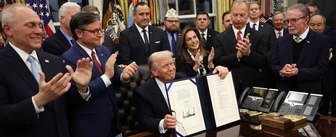Last week's announcement of the first results of the 2020 decennial U.S. Census indicated a slowing down of population growth, with the smallest increase in population since the Great Depression, and a slight shift in favor of Republican-leaning states in the reapportionment of House of Representatives seats.
The Constitution explicitly requires the Census be carried out, as Congress determines, and this decade’s Census had to be conducted during the global COVID-19 pandemic. The latest Economist/YouGov poll was mostly conducted before the official Census announcement. In fact, nearly seven in 10 Americans (69%) said they had heard nothing at all about the upcoming data release.
There is a consensus about the Census that crosses party lines: Americans generally believe the Census Bureau only did a ‘fair’ job conducting the population count during the pandemic (45%), that it counted fewer people than actually reside in the United States (52%), and it would have done better had the pandemic not occurred (51%).
Republicans (57%), Democrats (56%), and Independents (51%) tend to believe there are more people in the country than were counted (in other words, that there was an undercount).
But Americans have always doubted that the Census, especially this one, would be able to count everyone. In an Economist/YouGov poll conducted a year ago, 59% expected that the 2020 Census would count fewer people than there were in the country. A majority also believed that there were more people in the United States in 2010 than were counted in that year’s Census.
Overall, Americans tend to give the 2020 Census fair (45%) or good (31%) marks – though more than a third (37%) give it more credit than that. One in five Republicans (20%), however, say the Census did a “poor” job conducting the decennial Census during the COVID-19 pandemic.
Three in five Democrats (63%) are pretty sure the Census would have done better had there been no pandemic. Just 46% of Republicans agree, and another 46% think the Census would have been the same without the pandemic.
Some of the GOP feeling that the Census would not have been any more accurate if there had been no pandemic is due to low expressions of concern among many Republicans about the coronavirus itself. About seven in 10 Republicans (69%) are “not too worried” or “not worried at all” about personally contracting COVID-19. Most in this group don’t think that the Census would have been better if there had been no pandemic.
Related: The 51st and 52nd states? What Americans think about Washington D.C. and Puerto Rico’s future
See the toplines and crosstabs from this Economist/YouGov poll
Methodology: The Economist survey was conducted by YouGov using a nationally representative sample of 1,500 US Adult Citizens interviewed online between April 25 - 27, 2021. This sample was weighted according to gender, age, race, and education based on the American Community Survey, conducted by the US Bureau of the Census, as well as 2016 Presidential vote, registration status, geographic region, and news interest. Respondents were selected from YouGov’s opt-in panel to be representative of all US citizens. The margin of error is approximately 2.7% for the overall sample
Image: Getty










